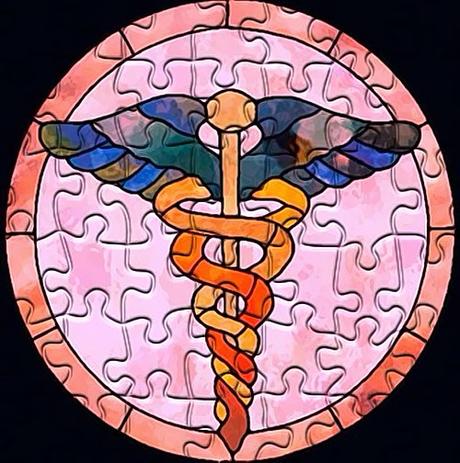
Caduceus I © lynette sheppard
Those of you who’ve been reading this blog over the years know that I am endlessly frustrated about the lack of research on women’s health issues, particularly menopause. Cassie, RN and ehealth informer gives us practical steps in this call-to-action guest post. Let’s go for it!
How to Get the Government to Care About Women’s Health
As a woman, you’ve almost certainly experienced gender bias in some form in your lifetime. One place you probably don’t think about experiencing the adverse effects of gender stereotypes is with your health care provider. Unfortunately, gender bias is a real concern that is harming women’s health in definite ways.
The gender bias problem in health care means women often don’t receive the same level of attention and consideration from their medical providers as men. This can lead to women unnecessarily struggling with chronic pain, with enduring needless procedures and being incorrectly diagnosed with anxiety and other mental health disorders. Gender bias also means issues related to women’s health receive less attention and funding than health problems experienced by men.
Since the idea of gender bias in health care was recognized in the 1970s, advocates for women’s health have been documenting and researching the ways women are discriminated against in health care.
By understanding and recognizing gender bias in health care, you can help protect and improve access to nondiscriminatory health care services for yourself and all women.
Speak Up
As women, we are often taught to be deferential to authority figures, such as medical professionals. If a doctor tells you your symptoms are related to anxiety or psychosomatic in nature, it can be tempting to accept the diagnosis and attempt to live with the discomfort as best you can.
Remember, you know your body better than any medical professional. If you’re sure there is something wrong, then stand your ground. Refuse to be put off by a diagnosis that doesn’t relieve your symptoms. Keep asking for tests and referrals to specialists until someone discovers the source of your problems. Don’t allow yourself to be convinced you don’t know your body.
By pushing back against medical professionals who attempt to minimize your symptoms, you will be more likely to get the care you need.
Contact Your Representatives
Though you might not realize it, the government has a lot of influence over medical research. Through the Food and Drug Administration and various grant programs, the government directly influences research across a wide spectrum of the medical industry.
Currently, much medical research skews toward primarily understanding how diseases and medications affect men. As women, though, effects of certain diseases such as cardiovascular disease present very differently in women than they do in men. Inequality in research means treatment for serious diseases is focused on what works for men, leaving women to utilize treatments that may be less than effective for our gender.
To help effect change, you can reach out to your congressional representatives and let them know you support legislation requiring government-funded medical research to include gender considerations, such as the Research for All Act. As more women let legislators know we are aware of the problem of gender bias in medicine, and we support fair and equitable research practices, representatives will be more likely to take up the cause. Representatives can draft legislation requiring researchers to give equal consideration to the ways women are affected by medical issues to receive state and federal funding.
Support Women’s Health Organizations
Organizations such as the Sex and Gender Women’s Health Collaborative, the Stanford Center for Health Research on Women and Sex Differences in Medicine and the National Institutes of Health Office on Research on Women’s Health are all working to improve the gender bias in the medical community. Some of the organizations are working with medical schools and nursing programs. Others are working with legislators to change the laws governing approved methods of medical research. NIH has changed the requirements for grant funding to ensure researchers are testing effects on both male and female subjects to ensure the results of any research apply to both genders.
You can support the organizations working to end gender bias in medicine by joining in discussions and events, volunteering your time or contributing money toward their efforts. These organizations are contributing many resources to promoting equality in health care, and they need our support to continue their important work.
Don’t Give Up
If you are fighting a battle against gender bias in your personal health, it might feel as if it’s one you can’t win. Hearing your doctors tell you the symptoms you’re experiencing are “all in your head” can be frustrating and demeaning. The important thing is not to give up. Insist the doctors listen to you and review all of your records. Keep insisting until you find someone to listen.
Organizing all your medical records in one place so your providers can see your complete history, including the results of any tests, the details about your condition and the dates of treatment will provide undeniable proof of your symptoms.
You can get an app such as My Medical or ChartSpan to record everything related to your medical history. If you are concerned about privacy issues when accessing your medical history on a mobile device, consider using a Virtual Private Network to encrypt your network connection and protect your medical records.
In our modern world, there is no reason women’s health care should be subject to the antiquated gender bias that currently exists in our system. We all need to speak up and demand to be heard and treated for our actual symptoms instead of being told we are imagining our illnesses. As human beings, we all deserve quality medical treatment, regardless of our genders.
Author bio: As a woman and a nurse, Cassie loves writing about women’s health and wellness issues. Helping women live healthier, pain-free lives is her dream come true.

